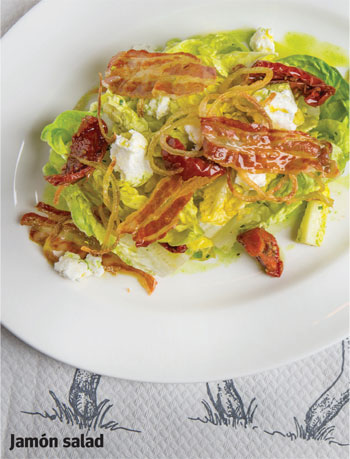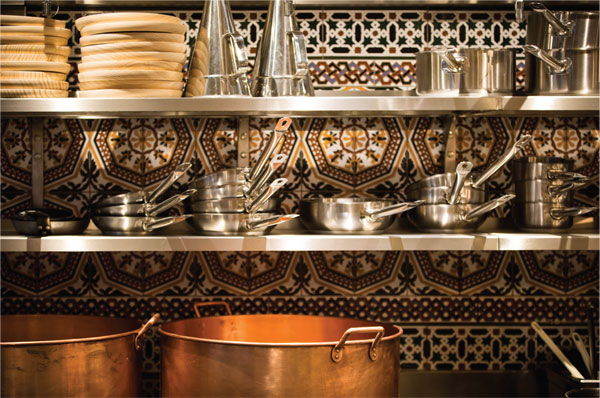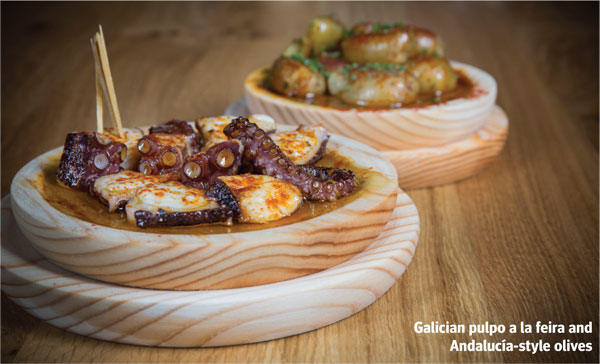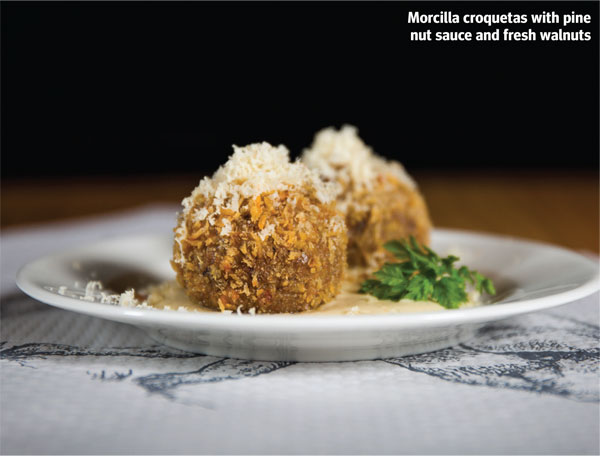Restaurant profile: Nieves Barragán Mohacho and José Etura's Sabor, London
Over a decade ago, two young Spaniards arrived in London without a word of English or a moment's hospitality experience between them. Now, Nieves Barragán Mohacho and José Etura are set to open one of London's most eagerly anticipated new restaurants of 2018. Tom Vaughan hears their story
The buzz around the restaurant, which has been building for the best part of a year, reflects the esteem with which diners hold the duo following their time together at Barrafina. Sitting in their new restaurant, with bubble wrap still on the chairs and the chatter of chefs getting to grips with the open kitchen, the pair are adamant that now was the right time to go it alone. "We loved Barrafina, we loved what the Harts [owners and brothers Eddie and Sam] did for us, but we needed to do something for ourselves and to bring something new to London," explains BarragÁ¡n Mohacho. Etura agrees: "We had a great concept that we really believed in, so now was the time."
In February 2017 the pair parted ways with Barrafina, where they'd helped launch the original Frith Street restaurant in 2006, followed by subsequent Adelaide Street, Drury Lane and Dean Street sites, with BarragÁ¡n Mohacho as executive chef and Etura rising from a humble glass cleaner to operations director. Now going it alone, their aim from the very beginning has been to bring unabashed regional Spanish food to Londoners.
Helping hands
To make this happen, however, they needed the backing of business partners. And luckily, shortly after leaving Barrafina, they landed themselves one of the hottest players in the game - JKS Restaurants, owners of Trishna, Gymkhana, Hoppers, Bubbledogs and Bao (all in London). "One of our friends knew the guys there," explains BarragÁ¡n Mohacho, "so we approached them. The first thing they said was 'we never thought you guys would come to us'. They were so happy and so were we."
With JSK impressed by the pair's concept for Sabor - which draws on influences from the regional cuisines of the Basque Country, Castile and Galicia - the pair next had to find a site. "We only saw one and we fell in love straight away," says Etura. "But we weren't the only ones who wanted it. Twelve others were interested, and it was narrowed down to six. And then the owners, the Crown Estate, told us we had to do a test against them!"
That's right: to get their Heddon Street site in Mayfair, the pair had to win an old-fashioned cook-off. It was time to put Sabor's concept to the test. BarragÁ¡n Mohacho whipped up for the judges what the duo hope will become the stars of Sabor: suckling pig cooked Castile-style in a wood-fired oven, Galician pulpo a la feira (octopus simmered in a copper pot), and Castilian caldeira fish stew.
"They called us two hours later - they said they didn't have to think about it, we were the unanimous choice!" says BarragÁ¡n Mohacho.

f the regional Spanish concept sounds like a pitch-line to investors that might be lost on the average diner, a walk through the new site proves otherwise. It's not just a few lines in a dish description that separates the different cuisines, but whole areas of the restaurant - with a downstairs bar, counter-top restaurant, and an upstairs asador (a wood-fired oven) all featuring different menus and atmospheres.
"If you want to eat at the bar it is more like the south of Spain - tapas dishes, AndalucÁan-style olives, jamÁ³n. If you want to eat at the restaurant it is more like Basque or Catalan food. But if you really want a brasserie feel, you can eat upstairs, where it is big family-style sharing food from Castile and Galicia. It's a journey through Spain," says BarragÁ¡n Mohacho.
The aim for Sabor is to have a core of signature dishes supplemented by a daily changing seafood display and seasonal vegetables.
"You could eat every day different or every day the same," explains BarragÁ¡n Mohacho. And it's those signature dishes that are already getting pulses racing - upstairs, those big sharing dishes of suckling pig, octopus and giant empanadas are soaking up plenty of the attention, but downstairs, the likes of arroz con salmonetes (crispy skinned red mullet sat atop silky rice) and wild rabbit empanadillas are equally as enticing.
Kitchen drama
As with Barrafina, an open kitchen - decked out in AndalucÁan tiles - is at the heart. After years under the watchful eye of her diners, would BarragÁ¡n Mohacho ever want to go back to the anonymity of a closed kitchen? "Never! This is one of the things I enjoy and the staff enjoys so much - listening to your guests, hearing the feedback straight away. This is the most important thing for my chefs relaxing and talking to the customers."
Dialogue is key. When Barrafina first opened, Spanish food in the UK was mostly paella and tapas chains, and Barrafina was certainly a gamble on the part of Sam and Eddie Hart. A no-bookings tapas bar at a time when reservations were as crucial to a restaurant as running water? "You didn't know if it was going to be a success or close the next day," says Etura. "Who wants to wait in a line? Now so many places don't take bookings. They both deserve huge credit for that."
A big part of that success was down to their secret weapon - BarragÁ¡n Mohacho. After arriving aged 20 from the sleepy port town of Santurtzi near Bilbao, with no hospitality experience and no English, she landed a first job as a kitchen porter at Simply Nico's in London.
"It was hard. At that time it was a different world," she says. "The only way to get respect was to show people you could do it. So if I had to peel something, I made sure I was the fastest at peeling because I wanted the job. Two months later I was working in the cold section."
The one year she'd planned to spend in London turned to two, three and then four as she began scraping her way up the industry ladder. And when the Hart brothers opened their first Spanish restaurant, Fino's, head chef Frenchman Jean-Philippe Patruno decided that he needed some native knowledge and remembered the determined young female chef he'd worked with at Simply Nico's.
Before long, BarragÁ¡n Mohacho took over as head chef and then helped the boys open the first Barrafina. How much of that restaurant's DNA was hers? "Sam and Eddie used to live in Barcelona and go to Cal Pep, and they would say 'we need to open something like this in London'. So it was their idea. But the menu - that was my menu."
It was at Barrafina where she met Etura, who was trying to learn English to help what he hoped would be a career in business. A master at managing the restaurant's long queue with renowned grace, he quickly rose from glass washer to operations manager.
As they both share their back stories you can easily believe them - BarragÁ¡n Mohacho with the sort of steely determination that would have her win a peeling competition with her eyes closed, and Etura exuding the kind of affable charm that would still leave you smiling after telling you there was a two-hour wait for a table. And at Barrafina, the small, open space gave both personalities a chance to shine Most importantly, the open kitchen gave BarragÁ¡n Mohacho a chance to demystify many of the dishes. "Customers can see, hear and smell the cooking - you can't get better than that. It makes it very easy to sell dishes."
Tastes of Spain
As Barrafina's success grew, so did its more esoterically Spanish offerings, including milk-fed lamb's brain and sherry. Are there any Iberian secrets left for Sabor to popularise? "There's the suckling pig and the octopus, of course, and vermouth," smiles Etura. "In Spain, people will stop in on a Sunday for a vermouth and tapas and then go home for a Sunday lunch. I'd love to see people doing that here."
There's barely time to dwell on the other fastidious details of Spanish culture the pair have sourced - the dedicated jamÁ³n carver they've brought over from southern Spain, the weighty earthenware dishes to serve the suckling pig and octopus, the imported clay oven, the AndalucÁan tiles that clad the open kitchen.
Bearing in mind how much they rely on their homeland for inspiration, be it ingredients or cookware, has the Brexit vote made things harder? "For sure," replies Etura, sitting upright as soon as the topic is raised. "The pound is weaker against the euro, which immediately makes it more expensive to bring things over. Probably we will have to start paying people more to entice them to come to London when they could go to Germany or Spain or France to learn and not have to worry about a visa. It's sad - just as it looks like globalisation is bringing people together, we choose to pull away."
As the interview wraps up, I remind them what a great story theirs is and I catch sight of their kitchen porters, beavering away. How many don't speak English? I ask. "A few," replies BarragÁ¡n Mohacho. "But we're here to help them." And so it hopefully continues.
Sabor
The restaurant
Covers 19 (and six on the terrace)
Bookings No
Style A dining counter facing an open kitchen
Menu Draws on influences from Catalonia and the Basque Country as well as from across Spain. Dishes include wild rabbit empanadilla; Jerusalem artichoke and jamÁ³n tortilla; arroz con salmonetes (crispy-skinned red mullet with rice); and bombas chocolate with coffee toffee sauce. A daily changing seafood counter will display fish that can be ordered by weight
Team Six chefs on service
Average spend £35 before drinks
The bar
Covers 25
Bookings No
Style Inspired by the tapas bars of AndalucÁa
Menu Drinks will include eight different Spanish gins, sherry, wine, txakolis and vermouths from across Spain, including draught vermouth from producer MartÁnez Lacuesta. Dishes include cured presa Iberica; Morcilla croquetas with pine nut sauce and fresh walnuts; and AndalucÁa-style olives
Seating Guests happy to wait for a seat in any area can drink at the bar
Team Two bar staff and a dedicated jamÁ³n carver
Average spend £25 before drinks
The asador
Covers 29
Bookings Will take reservations but seats are reserved for walk-ins
Location Upstairs, via a wrought-iron spiral staircase
Style Large sharing tables and an open kitchen featuring an asador (wood-fired oven) sourced from Castile and giant copper pots
Menu Focuses on Castilian-style whole suckling pig and octopus cooked in copper pots with olive oil and paprika and served on earthenware sharing platters. Other dishes will include crab empanada, Castilian caldeira (fish stew) and a daily changing whole fish on the bone
Team Three chefs on service
Average spend £35 before drinks
Vermouth: the next big thing?
"Our draft vermÁº - in Spanish you can use either the word vermÁº or vermut, and prefer the first one - is going to be MartÁnez Lacuesta from La Rioja, a winery founded in 1895 and still run by the same family," says José Etura. "We will also have his VermÁº Reserva, which is barrel-aged in French oak. "There will also be vermÁº from Jerez - the red has sweet notes as it is made from Pedro Ximénez grapes, and the white comes from Amontillado, so it will be dry and nutty. And we have Yzaguirre Blanco and Rojo - founded in Tarragona in 1884 and still run by the same family. One of the most popular vermÁºs in Spain, it uses 80 botanicals and is made from the original recipe.
"Finally, we have Mariol Blanco. I like this - it has an intense aroma. This was founded 100 years ago in Batea [Catalonia] and the business is run by the great-grandsons of the founders, Marta and Josep Maria."













